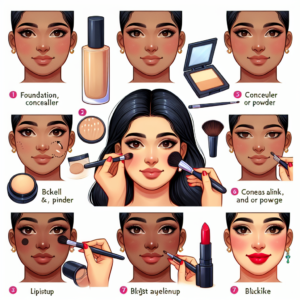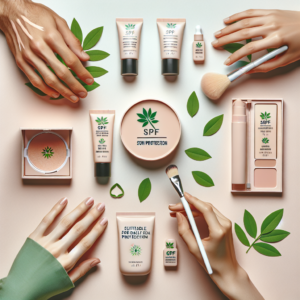
Article-At-A-Glance:
-
Understanding what breathable makeup is and why it’s vital for those with congested skin.
-
Exploring the scientific principles that allow makeup to be both covering and non-comedogenic.
-
Discovering the best vegan foundations that promote skin health and clarity.
-
Identifying key natural ingredients that enhance the breathability of foundations.
-
Learning the correct application techniques to ensure your makeup enhances skin health.
When it comes to makeup, there’s a delicate balance between enhancing your natural beauty and taking care of your skin’s health. For those of us with sensitive or acne-prone skin, the fear of congested pores can often deter us from enjoying the world of cosmetics. But what if I told you that you don’t have to choose between looking good and feeling good? That’s where breathable makeup comes in.
Defining Breathable Makeup and Its Importance for Congested Skin
Imagine a foundation that covers imperfections, evens out your skin tone, and yet, feels like you’re wearing nothing at all. That’s the magic of breathable makeup. It’s specially formulated to allow your skin to ‘breathe’, meaning it doesn’t clog pores, leading to fewer breakouts and happier skin.
For those of us with congested skin, which is skin that’s prone to blackheads, whiteheads, and pimples due to clogged pores, breathable makeup is a game-changer. It’s not just about avoiding breakouts; it’s about giving your skin the space it needs to function naturally, to regulate oils, and to shed dead skin cells without interference.
The Science Behind Makeup That Lets Your Skin Breathe
So, how does makeup allow your skin to breathe? It all comes down to the formulation. Non-comedogenic products are designed to not block pores. They often contain ingredients like hyaluronic acid, which helps retain moisture without adding oil, and minerals like zinc oxide and titanium dioxide, which provide protection from the sun while being gentle on the skin.
Most importantly, breathable makeup is often free from certain oils and waxes that can create a barrier too thick for the skin to manage. Instead, it uses lightweight alternatives that provide coverage without suffocating the skin. This means that while your skin is adorned with makeup, it’s still able to go through its natural processes.
Top Picks for Vegan, Breathable Foundations
In the quest for clear, happy skin, vegan makeup has taken center stage. Vegan formulas are often more gentle since they’re free from animal-derived ingredients, which can be harsh and irritating for sensitive skin types. Plus, they align with a cruelty-free lifestyle, which is a win-win for both your skin and ethical standards.
Natural Ingredients to Look for in a Breathable Foundation
When shopping for a vegan foundation that breathes, here are some key ingredients to look out for:
-
Aloe Vera: Known for its soothing properties, it’s a great base for sensitive skin.
-
Chamomile Extract: Another calming ingredient that reduces inflammation and calms redness.
-
Green Tea Extract: Packed with antioxidants, it helps protect the skin from environmental stressors.
These plant-based ingredients are not only kind to your skin but also help to maintain its natural balance.
Our Favorite Vegan Formulas for Clear Skin
Let’s talk about a few vegan foundations that have stolen our hearts. One standout is the Pure Cream Hue’s Flawless Finish Foundation. It’s a lightweight formula that provides medium to full coverage and is enriched with natural SPF from zinc oxide. Another favorite is the Mineral Love’s Matte Foundation, which uses mica to reflect light and reduce the appearance of pores without clogging them.
These products not only cover imperfections but also care for your skin throughout the day. They’re proof that you can achieve a flawless look without compromising your skin’s health.

How to Properly Apply Makeup for Maximum Breathability
Applying breathable makeup is just as important as choosing the right product. Here’s a quick guide to ensure you’re getting the most out of your makeup:
-
Start with a clean canvas: Always cleanse your face thoroughly before applying makeup to remove any impurities or excess oils.
-
Use a non-comedogenic primer: This will help create a smooth base and enhance the longevity of your foundation.
-
Apply with a light hand: Use a damp beauty sponge or brush to apply your foundation in thin layers, building up coverage only where needed.
By following these steps, you’ll ensure that your makeup not only looks good but also contributes to the overall health of your skin.
Step-by-Step Guide to a Skin-Friendly Makeup Routine
Creating a makeup routine that’s kind to your skin is easier than you think. Follow these steps to ensure your makeup enhances your skin’s health:
-
Moisturize: Start with a lightweight, oil-free moisturizer to hydrate your skin. This step is crucial to prevent your makeup from clinging to dry patches.
-
Prime: Use a hydrating, non-comedogenic primer to smooth the skin’s surface. This also helps your makeup to stay put without clogging pores.
-
Apply Foundation: Use a foundation brush or sponge to apply your breathable foundation. Start from the center of your face and blend outwards for a natural look.
-
Conceal: If needed, apply a vegan concealer to any blemishes or under-eye circles. Pat gently with your finger to blend.
-
Set: Use a translucent powder to set your makeup. Focus on areas that tend to get oily throughout the day.
-
Add Color: Apply a mineral-based blush or bronzer for a healthy glow. Remember, less is more.
-
Finish: Set your makeup with a spritz of setting spray. Choose one that’s designed to soothe and hydrate the skin.
By following these steps, you’ll create a beautiful makeup look that’s as good for your skin as it is gorgeous.
Tips to Avoid Clogged Pores Even With Makeup On
Even with breathable makeup, there are extra precautions you can take to keep your pores clear:
-
Choose Wisely: Always opt for makeup labeled non-comedogenic, oil-free, and fragrance-free.
-
Clean Tools: Regularly wash your makeup brushes and sponges to prevent the spread of bacteria.
-
Touch-up Tactfully: If you need to touch up during the day, use blotting papers to absorb excess oil without adding layers of makeup.
-
Stay Hydrated: Drink plenty of water throughout the day to help flush out toxins and keep your skin hydrated.
These simple habits can make a big difference in maintaining clear, healthy skin beneath your makeup.
Skincare Routines to Complement Breathable Makeup
Essential Pre-Makeup Skincare Steps for Unclogging Pores
A good skincare routine is the foundation of clear skin. Here’s what to do before you even think about applying makeup:
-
Gentle Cleansing: Use a mild cleanser to remove dirt and oil without stripping the skin.
-
Exfoliate: A few times a week, use a gentle exfoliant to remove dead skin cells that can clog pores.
-
Tone: Apply a toner to balance your skin’s pH and tighten pores.
-
Moisturize: Hydrate with a non-comedogenic moisturizer to keep your skin smooth and supple.
-
Sun Protection: Always finish with an SPF to protect your skin from harmful UV rays.
This routine will help to unclog pores and prepare your skin for makeup application, ensuring a clearer complexion.
Post-Makeup Removal Care to Maintain Skin Clarity
After a day of wearing makeup, it’s crucial to thoroughly remove it to prevent congestion. Here’s how:
-
Remove Makeup: Start with a gentle makeup remover or oil cleanser to break down makeup.
-
Cleanse: Follow up with your regular cleanser to ensure all traces of makeup and oil are gone.
-
Hydrate: Apply a soothing, hydrating toner followed by a moisturizer to replenish your skin.
These steps will help keep your skin clear and ready for the next day.
Understanding the Role of Non-Comedogenic Products

Demystifying the Non-Comedogenic Label: What Does It Truly Mean?
The term ‘non-comedogenic’ is a promise that a product won’t clog your pores. But it’s important to note that this isn’t a regulated term, so it’s up to the brand to substantiate that claim. Generally, non-comedogenic products avoid ingredients known to clog pores, like certain oils and silicones.
When choosing non-comedogenic makeup and skincare, it’s essential to read the ingredient list and understand your skin’s specific needs. Remember, what doesn’t clog one person’s pores may clog another’s. It’s all about finding what works for you.
By incorporating non-comedogenic products into your routine, you’re taking a significant step towards clearer, healthier skin.
Curating a Non-Comedogenic Makeup Kit
Building a makeup kit that won’t contribute to skin congestion is about more than just picking the right foundation. Every product that touches your face should be chosen with care. Look for products labeled oil-free and non-comedogenic across the board, from your concealer to your setting powder. Consider mineral-based products, which are often gentler on the skin and less likely to cause breakouts. And don’t forget about your tools – brushes and sponges should be cleaned regularly to prevent the spread of bacteria.
Alternative Solutions for Makeup Lovers with Congested Skin
If traditional foundations seem too heavy for your skin, or if you’re just looking for a lighter option for everyday wear, there are alternatives that can provide coverage while being kinder to your skin.
When to Choose Tinted Moisturizers and BB Creams
Tinted moisturizers and BB creams are excellent alternatives to full-coverage foundations. They typically offer a light to medium coverage and come with the added benefits of hydration and, in many cases, sun protection. These products are perfect for those days when you want a more natural look or when your skin needs a break from heavier makeup. They’re also a great option for younger makeup enthusiasts who are just starting to explore cosmetics.
The Role of Primers in Protecting Congested Skin
Primers are not just about making your makeup last longer; they can also protect your skin from becoming congested. A good primer can create a barrier that prevents makeup from sinking into pores, which is crucial for maintaining clear skin. Look for primers that are specifically designed to minimize the appearance of pores and that boast a non-comedogenic formula.
Navigating the Market: Shopping Tips for Breathable Makeup
Shopping for makeup that won’t clog your pores can be overwhelming with all the choices available. Here’s how to navigate the market to find products that are truly skin-friendly.
Must-Know Do’s and Don’ts When Buying Makeup for Congested Skin
-
Do: Read ingredient labels carefully. Avoid ingredients like coconut oil and cocoa butter, which can be comedogenic.
-
Don’t: Assume that expensive products are better for your skin. Price doesn’t always correlate with quality.
-
Do: Test products when you can. Patch testing on your inner arm can help you identify any potential reactions before you apply it to your face.
-
Don’t: Ignore your skin’s reactions. If a product causes breakouts, stop using it immediately.
-
Do: Look for products with added skin benefits, such as antioxidants and hydrating ingredients.
Decoding Labels: Marketing vs. Actual Benefits
Marketing terms like ‘dermatologist-tested’, ‘hypoallergenic’, or ‘for sensitive skin‘ can be helpful, but they’re not guarantees. The only way to truly know if a product is non-comedogenic is to look at the ingredients and understand how they interact with your skin. Be wary of claims like ‘won’t clog pores’ or ‘controls oil’ unless they’re backed by ingredient lists that support those claims. When in doubt, do your research or consult with a dermatologist.
Remember, the right makeup should make you feel confident and beautiful, without compromising the health of your skin. By being informed and selective, you can build a makeup routine that works in harmony with your skin’s needs, keeping it clear, healthy, and radiant.
Myths vs. Facts: Understanding Skin Respiration
Can Skin Really ‘Breathe’? Scientific Insights
Let’s clear the air: the skin doesn’t breathe like our lungs do. However, skin respiration refers to the skin’s ability to allow gases and moisture to pass through. This is essential for maintaining the skin’s natural barrier and for the overall health of the skin. Breathable makeup supports this process by not creating an occlusive layer that could trap sweat, bacteria, and sebum, which could lead to congestion and breakouts.
Common Misconceptions About Makeup and Skin Health
There are many misconceptions floating around about makeup and skin health. Here are a few:
-
Myth: Makeup needs to be heavy to provide good coverage.
-
Fact: Light, breathable makeup can provide excellent coverage without clogging pores.
-
Myth: You can’t wear makeup if you have acne-prone skin.
-
Fact: Non-comedogenic and breathable makeup formulas are suitable for acne-prone skin.
-
Myth: Makeup causes skin to age faster.
-
Fact: Makeup that includes SPF and antioxidants can protect the skin from environmental damage that causes aging.
Key Takeaways: Prioritizing Skin Health with Vegan and Breathable Makeup
When it comes to maintaining skin health while enjoying makeup, remember these key points:
-
Select makeup that’s labeled non-comedogenic to avoid clogged pores.
-
Opt for vegan formulas with natural ingredients that are less likely to irritate sensitive skin.
-
Remember to cleanse thoroughly at the end of the day to remove all traces of makeup.
-
Invest in quality makeup tools and keep them clean to prevent bacterial transfer.
-
Always patch test new products to ensure they don’t cause irritation or allergic reactions.
Frequently Asked Questions (FAQ)
Can wearing makeup cause skin congestion?
Wearing makeup can contribute to skin congestion if it’s not suitable for your skin type or if it’s applied too heavily. To prevent this, choose lightweight, non-comedogenic makeup, and make sure to remove it completely before going to bed.
What are some vegan ingredients that promote skin breathability?
Several vegan ingredients are known for their skin-friendly properties. Some of these include:
-
Jojoba Oil: Mimics the skin’s natural oils and is easily absorbed without clogging pores.
-
Shea Butter: Offers moisturizing benefits without being heavy or greasy.
-
Tea Tree Oil: Has antimicrobial properties that can help keep pores clear.
-
Algae Extract: Hydrates and conditions the skin while providing essential nutrients.
These ingredients support the skin’s natural functions and are less likely to cause congestion, making them excellent choices for those seeking breathable makeup options.
How often should I clean my makeup brushes to prevent congested skin?
Cleaning your makeup brushes is a critical step in maintaining clear skin. Brushes can harbor bacteria, oils, and dead skin cells that can lead to congestion and breakouts. Therefore, it’s recommended to clean your brushes at least once a week. For brushes used with liquid products like foundation or concealer, consider cleaning them after every use to prevent the buildup of product that can create a breeding ground for bacteria.
Here’s a simple brush cleaning routine:
-
Wet the bristles: Run them under lukewarm water, avoiding the handle.
-
Apply cleanser: Use a gentle soap or a specialized brush cleaner and massage it into the bristles.
-
Rinse thoroughly: Wash out all the soap under running water until the water runs clear.
-
Reshape and dry: Gently reshape the brush head and lay the brushes flat to dry overnight.
Keeping your brushes clean not only helps prevent congested skin but also ensures the best application of your makeup.
Can I wear makeup if I have acne-prone skin?
Yes, you can wear makeup even if you have acne-prone skin. The key is to choose products that are formulated to not aggravate your skin condition. Look for makeup that’s labeled as non-comedogenic, oil-free, and free of potential irritants like fragrance. Mineral makeup is often a good choice because it’s less likely to clog pores and can have a calming effect on the skin.
Additionally, make sure to apply makeup on clean skin and remove it thoroughly at the end of the day. Never sleep in your makeup, as this can lead to more breakouts. Incorporating a gentle, acne-fighting skincare routine can also help manage breakouts while wearing makeup.
Are there specific makeup products that are better for sensitive skin?
Sensitive skin requires special attention, and thankfully, there are makeup products designed with sensitivity in mind. Hypoallergenic makeup is formulated to minimize the risk of allergic reactions and is often suitable for sensitive skin. Products with minimal and natural ingredients reduce the likelihood of irritation.
Here are some product recommendations for sensitive skin:
-
Mineral Makeup: Typically free from preservatives and artificial fragrances that can irritate sensitive skin.
-
Talc-Free Powders: Talc can cause dryness and irritation, so opt for talc-free formulas.
-
Physical Sunscreens: Chemical sunscreens can be harsh; look for makeup with physical SPF ingredients like zinc oxide or titanium dioxide.
Always patch test new products to ensure they don’t cause irritation, and consult with a dermatologist if you’re unsure about which products to use.
In conclusion, makeup should be a joyful and enhancing part of your daily routine, not a source of skin stress. With the right products and practices, even those with congested, acne-prone, or sensitive skin can enjoy the benefits of makeup. By choosing breathable, vegan makeup with SPF, you’re not only doing a favor for your skin but also for the environment and animal welfare. Remember to clean your makeup tools regularly, select products with care, and never compromise on your skincare routine. With these tips in mind, you can achieve a beautiful makeup look that’s as kind to your skin as it is to the world around you.




